
Jenan Taylor
14 May 2023
Hospital chaplains at the Melbourne diocese face an uncertain future as major funding cuts to the health chaplaincy program loom.
The Anglican Diocese of Melbourne has announced that it will cease funding chaplains by the end of 2023.
Archbishop Dr Philip Freier said in an internal circular the decision to cease funding arose from an organisational and budget review of the diocese.
Dr Freier said the diocese was exploring ways to maintain its presence in public hospitals and was waiting to hear whether the state government would continue to fund spiritual care programs there.
Health chaplaincy coordinator the Reverend Dawn Treloar said not knowing whether there would be state government support complicated the ability to plan the delivery of the program, and clouded the outlook for the chaplains themselves.
But health sector spiritual care peak body the Spiritual Health Association said in a recent federal budget submission that the Victorian state government’s core funding into health chaplaincy could not be relied upon to be ongoing.
Read more: Hospital chaplains shoulder grief, share joy in COVID ‘trenches’
Archdeacon for Diocesan Partnerships the Reverend Dr Nick White said the diocese was weighing up chaplaincy program funding models.
Dr White said current financial support came from a number of sources, and that the diocese provided 80 per cent.
He said the remaining funding came from the Victorian government through the Spiritual Health Association, and, at times, philanthropic assistance.
Dr White said it was possible some spiritual health care models might develop out of joint backing from state government, philanthropists and hospitals, or from hospitals employing chaplains directly.
Ms Treloar said nine chaplains delivered care in seven hospitals.
She said funding model considerations in each instance had to include the chaplain’s employment status, and the healthcare provider’s policies and priorities.
But she said not knowing whether government funding would continue made planning difficult, and left chaplains feeling unsure about their future.
She said they cared deeply about supporting people and it was rare for them to work fewer than seven and a half hours per shift, but there were some who were the sole income earners for their own families and had to consider paying bills.
Read more: Hospital chaplain’s care ministry in pandemic
Ms Treloar said the ideal model would be one where hospitals provided most chaplaincy funding, and where the diocese’s chaplains could deliver Anglican-specific care.
She said many hospitals valued how chaplains had cared for staff as well as patients and their families during the COVID pandemic, but how the ministry was perceived varied according to a hospital’s priorities.
The diocese had provided chaplains to people in need in hospitals since the 1800s, yet there tended to be a loss of recognition about what it was the church did these days, Ms Treloar said.
She said it was possible to quantify how many people the chaplains saw every day, but that the impact of their care went beyond statistics.
The figures wouldn’t show the sacramental ministries that were done or that some were with individuals who weren’t Anglican or persons who professed to have no faith, Ms Treloar said.
She said many of those sacramental moments were not just with patients, but with family members, some of whom might even be hostile initially, but who end up asking the chaplain to pray for them and admitting to being profoundly moved by their experience.
“We are blessed to be there. We are given opportunities to share the very worst moments in people’s lives. And to hopefully provide comfort for them, to provide them with an awareness of God’s love for them. And that’s what keeps all of us going,” Ms Treloar said.
The Victorian government has been approached for comment.
For more faith news, follow The Melbourne Anglican on Facebook, Twitter, or subscribe to our weekly emails.






